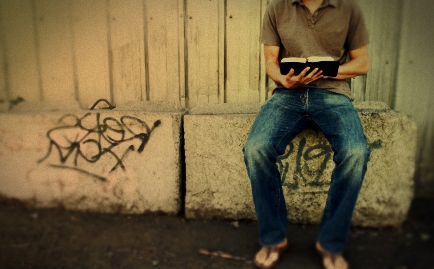I really enjoyed reading the comments from my last column. There’s nothing like a group of tender-hearted people saying “me too!” to reaffirm my suspicion that those thoughts I had were from God. I’m so glad we can share these things together and that God cares to bring us together. He is part of this conversation, too—the center of it. We’ve identified a real issue here. Though it’s much more complex than simple weakness of self-esteem, I believe that’s where it starts.
I’ve been trying to figure out how we tackle this monster together—in fact, I’ve been trying to figure that out since I turned 13 and realized my braces looked funny and boys’ heads were turning faster for other girls than they were for me. And quite frankly, a lot of the stereotypical “girl” advice has just never done it for me. I’ve read Proverbs 31 a million times, written “be thou my vision” on the top of my mirror in permanent marker and stopped reading glossy celebrity magazines showcasing unrealistic waistlines. But saying “I am beautiful” to myself every morning and reminding myself God loves me no matter what just has never done it for me, shamefully. It’s a just cause, but I guess I must be one tough cookie.
First, we need to talk about one of the most important lessons to be found on our journey. It’s one that I learned a long time ago but still struggle to implement daily. (That’s what we call the “human condition.”) The lesson is this: let go of the guilt.
I couldn’t possibly describe accurately the sickness I feel in my stomach when I hear the following words exit my mouth and streamline to my fiancé—which they do often, and sharply: “Do you think she’s prettier than me?”
Here’s the play-by-play of what goes on in my head right after such a question: What is my problem? First of all, how could I be so shallow?! I am better than that … aren’t I? How many times do I have to hear about the truth of inner beauty or how relationships based on pure physicality never last? Secondly, how could I put my fiancé in this position? What am I expecting him to say? If he says “no,” I’ll accuse him of lying to “protect” me. If he says “yes,” I’ll retreat into myself for days, unable to be angry at him because “he was telling the truth” but at the same time wanting to smack him for not finding me gloriously more beautiful than everyone else. Sheesh.
That is part of the dirty magic of Satan. Our preoccupation with our appearance and our own struggle with self-esteem is sin enough, destructive enough. But then there’s the other mountain of evil heaped on top: the guilt. And so now, not only do I scowl at the scale or that gorgeous girl on TV but I hate myself for feeling it. I dislike myself for my face; and then I dislike myself for disliking myself.
So my challenge to you is to let that go. Friends, our struggle with our image and our self esteem is just that—a struggle! It’s not a vice, or some shamefully shallow part of our personality. We’re not flaky people who care about nothing but lipstick and big sunglasses and soap-opera social circles. Just because we feel nervous about our appearance or wary of our weight does not mean we are vain or petty or even stuck-up. This is a problem; not a personality quirk. An attack. Not a vanity.
Here’s why letting go of the guilt you feel is such a major step: It’s impossible to try to help ourselves overcome our self-esteem battle when merely having the problem makes us dislike ourselves even more. Let yourself know, and believe, that this is a real problem and you’re halfway there. That doesn’t mean that your stomach won’t crawl when you feel a compulsion to ask your boyfriend or husband if that girl at the checkout counter has a flatter stomach than you. But at least you can assure yourself that you’re not being petty or just trying to trap your handsome friend. I promise that isn’t the case!
Another thing that will greatly help you in this process is to clue in your close friends and loved ones. Sharing my struggle with Aaron (my fiancé) was the right thing to do. Now, instead of being confused by “is she prettier” questions or wildly unpredictable “I feel fat” moments, he’s in this with me, recognizing I’m dealing with something and not revealing some terribly shallow side of me.
Letting those around me know about my struggle helped my own guilt, too, because now when I hear myself asking, “Do you wish I looked like her” or some other ridiculous, leading question to Aaron, I don’t have to cringe at what he must think of me for asking it. Aaron’s response now, instead of being, “What in the world are you talking about?” is, “Maria, let’s take a deep breath and talk about something else.”
So, step one: Let yourself believe you are struggling with a thorn in your side, like Paul (2 Corinthians 12:7), and not an embarrassingly shallow—but un-ignorable—compulsion. And let those around you know it, too. And maybe instead of being a secret embarrassment for you, this can turn into a holy battle. We’ll fight it together.





















